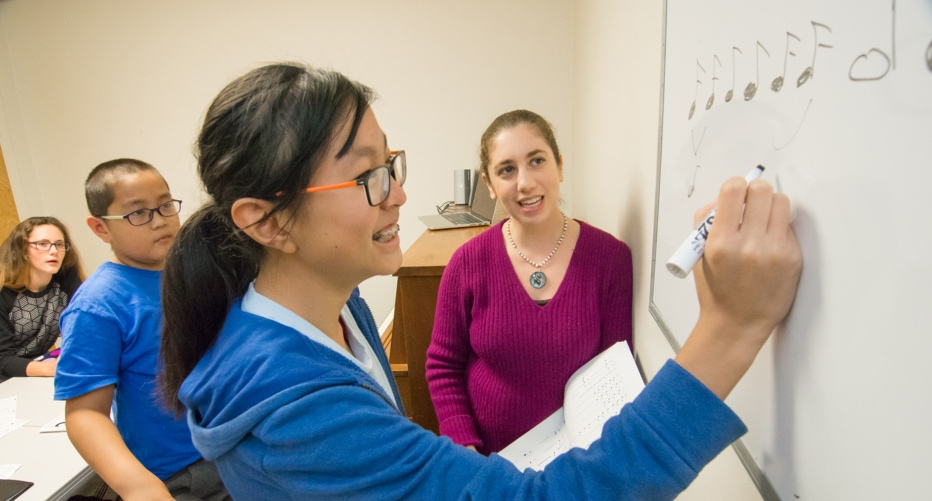Small group classes or private lessons with instructor Rebecca Sacks give your budding musicians the tools to sight-read melodies and rhythms more easily, to really get excited about and better understand the music they’re learning in instrument lessons (and elsewhere!), and to try their hand at crafting their own pieces and arrangements.
Think theory is boring, difficult, or too much work? Think again! Rebecca keeps classes and lessons interesting with the right mix of singing, hands-on activities, written exercises, and rewarding composition assignments to teach rhythm, melody, harmony, and notation. Want to really dive into those composition assignments? Join us for Rebecca’s composition lessons!
But besides being fun, theory and composition classes help students truly appreciate the music in the world around them. They progress faster in the study of their instrument, ensembles, orchestra, and choir. They become more confident, empowered, and creative as they learn to engage with all types and genres of music. They strive to learn, enjoy, and create even more than they thought was possible.
Here’s what parents are saying about music theory classes…
“Rebecca Sacks’s Music Theory class has been transformative for our eight-year-old son. Through melodic and rhythmic solfege exercises, he is learning to sight-sing and conduct. He is even writing his own eight-bar compositions! Ms. Sacks gives warm attention to each participant and keeps things challenging yet fun. If you have a musically-inclined child, we highly recommend this class as a rich compliment to lessons—or on its own!”
~ Elaine Dimopoulos & John Evans
Parents, see the joy on your child’s face as she performs her very own masterpiece.
Teachers, watch as your student becomes a faster, more competent sight-reader.
Students, take your skills up a notch and let out the music that’s been waiting inside of you!
Who should take theory?
Private lesson students ages 7-18 who are dedicated to their instruments, love learning new things, and are excited about the opportunity to compose their own music are great candidates for music theory classes or individual lessons at Powers. Music theory complements, not replaces, what is taught in private instrument lessons.
Will students be with others their own age?
Classes are grouped by age and level to keep students of similar abilities together.
What if our schedule conflicts with class times?
Theory classes are typically held on Saturdays, but we recognize that many students might also be participating in lessons, orchestra, ensembles, or other programs. Our instructors take student availability into consideration to make sure as many students can participate as possible. If no class time works with your schedule, another option is to consider private theory lessons.


